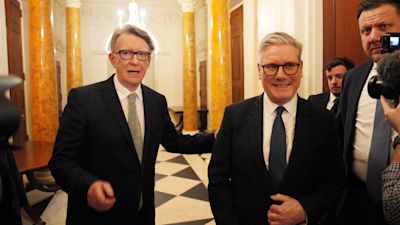London, UK — British Prime Minister Keir Starmer is set to meet with former U.S. President Donald Trump today to propose a European-led peacekeeping initiative, with the United States acting as a security guarantor for Ukraine in a post-war scenario.
“We understand this must be a European effort,” a British government official stated. “However, European defense and the stability of Ukraine will, to some extent, rely on U.S. involvement.”
Strengthening Transatlantic Ties
Starmer is the second of three European leaders visiting the White House this week, following a recent UK decision to reduce foreign aid while significantly increasing defense spending. His agenda also includes reinforcing the UK’s “special relationship” with the U.S. through expanded defense and economic collaboration.
A key aspect of this effort is a proposed partnership on advanced technology. The British official suggested that Starmer may find a more receptive audience in Trump compared to other European leaders, given Trump’s previous criticism of the European Union as an entity “formed to take advantage of the United States.”
Ukraine’s Future and U.S. Stance
Starmer’s visit precedes a major agreement between Ukraine and the U.S., set to be signed tomorrow, concerning mineral resources. However, Trump has signaled reluctance to extend robust security commitments to Kyiv, stating he would not offer protection “beyond very much.”
Meanwhile, diplomatic discussions between the U.S. and Russia have quietly resumed in Istanbul. These talks reportedly aim to restore full diplomatic ties, raising concerns among Trump’s critics about potential concessions to Moscow. Some fear that Trump’s approach may be overly lenient towards Russia, with The Economist noting, “If America must be ruthless, at least let it be brilliant. That is the prayer that [Trump’s] defenders… must murmur.”
Implications for European Security
The UK’s proposed initiative reflects broader European concerns over defense independence and long-term security planning. While European leaders acknowledge their responsibility for regional security, the reality remains that U.S. support, whether direct or indirect, is a crucial factor in countering Russian influence.
By pitching a U.S.-backed European security framework, Starmer aims to ensure that Europe can maintain stability without over-reliance on Washington’s unpredictable foreign policy shifts. This comes at a time when NATO allies are reassessing their defense commitments and financial contributions.
A Turning Point in U.S.-Europe Relations?
The outcome of Starmer’s discussions with Trump could shape the future of U.S.-Europe relations. If successful, the proposal could serve as a model for increased European responsibility in defense, with the U.S. playing a strategic yet supporting role.
As geopolitical tensions rise, Starmer’s diplomatic push underscores the delicate balance between European autonomy and continued transatlantic cooperation. The coming days may determine whether Trump views Europe as a reliable partner or a burden on U.S. interests.
For more insights on global diplomacy and international affairs, visit Issue N Fact.

